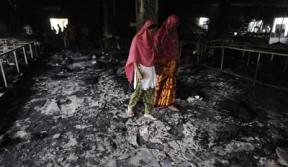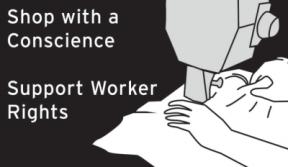By Tess Kalinowski
School board allies with workers group
Can monitor where uniforms are made
The Toronto Catholic school board has decided to put some teeth into a new policy requiring its uniform suppliers to guarantee that their garments aren't made in sweatshops.
The board will join eight others in Ontario that have contracted with the U.S.-based non-profit Worker Rights Consortium (WRC) to investigate complaints about apparel manufacturers. Factories found to abuse their workers or use child labour are published on the group's website.
The so called "no-sweat" policy, the subject of three years of lobbying by board students and Catholic social justice groups, initially passed last fall, but it did not include any way to monitor the factories being used by local uniform suppliers.
On Wednesday, however, trustees unanimously voted in favour of joining the Catholic Board Affiliation, which also includes the York Catholic District School Board, in a two-year contract with the consortium.
Initially, a majority of trustees said they were reluctant to join because of the cost. The $100,000 annual consortium fee will be split equally among the Ontario boards.
But given the board's $800 million annual budget, the fee was a red herring, said trustee Catherine LeBlanc-Miller.
"For $10,000, it gives us peace and makes our kids feel okay," trustee Maria Rizzo said. "It's not as if they have a choice about wearing a uniform. They can sweat in their uniform, but they don't want other people to have sweated for them."
Most students and parents would be willing to pay a few cents more to ensure their school uniforms were ethically manufactured, said Tahnee Pantig, in Grade 12 at Cardinal Carter Academy for the Arts.
"It's important for students to take an active role in creating change. In essence it's our role to determine what those changes are going to be," she said.
Some trustees were unwilling to alienate long-time uniform suppliers, such as R.J. McCarthy Ltd., which were concerned that the publication of their factory locations put them at a competitive disadvantage.
But yesterday, company president Martin McCarthy downplayed the impact of the policy, saying he was pleased it had been extended beyond student uniforms to include such items as lab coats and caretaker uniforms, so other suppliers would be held to the same standard.
"At the end of the day, we are now safe from accusations because anybody that wants to discuss any of our factories can go through WRC," he said.

